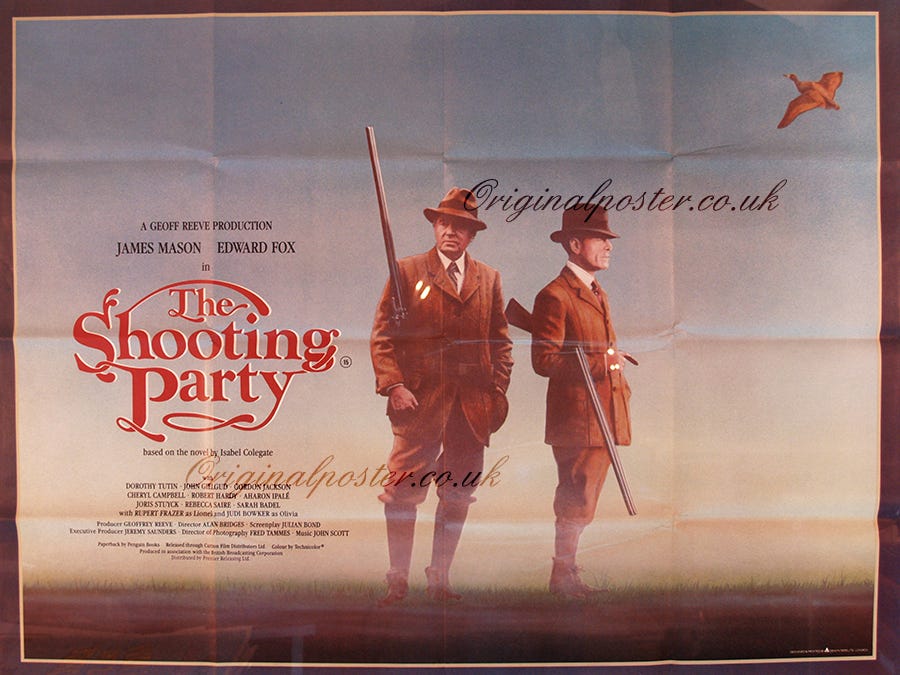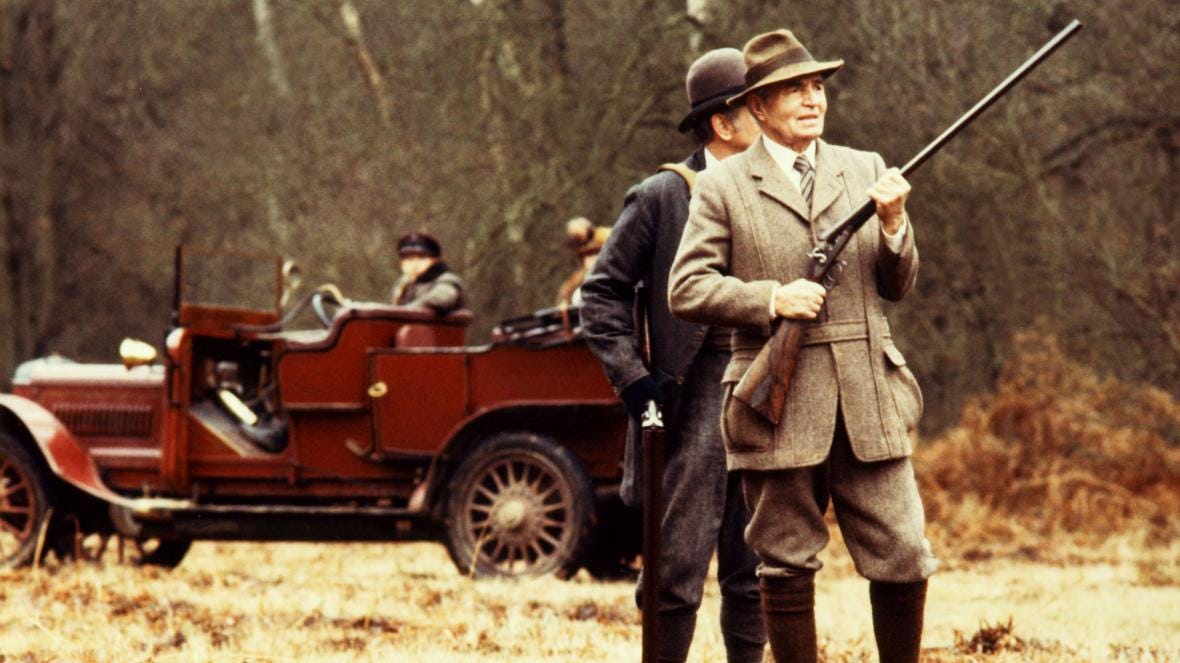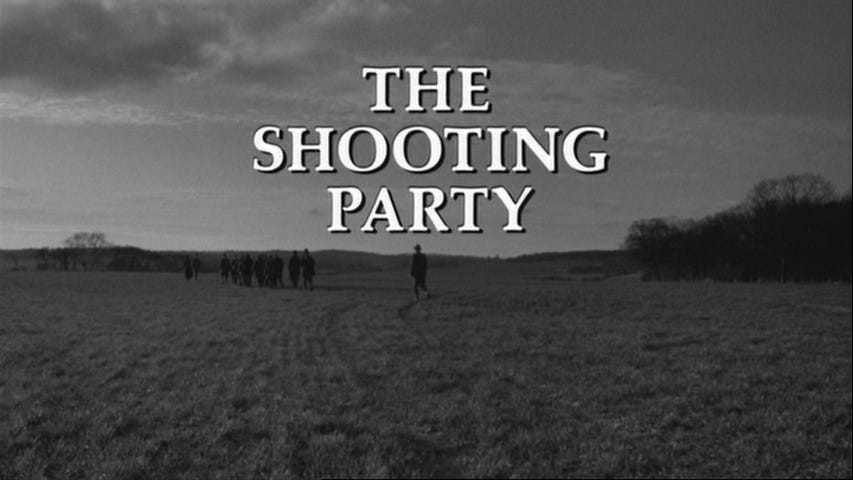Reactionary thinkers have long posited that World War I represents more than just a war but something akin to a spiritual inflection point for Western Civilisation. The beautiful, melancholy, and almost entirely forgotten 1984 film The Shooting Party, based on the eponymous novel by Isabel Colegate, transports us to 1913 and a world that was about to vanish. The Shooting Party boasts many British stage and screen heavyweights such as Edward Fox, John Gielgud, Gordon Jackson, Robert Hardy, Dorothy Tutin, and James Mason.
There’s undoubtedly no scarcity of English period dramas playing on the theme of aristocrats landing on a country manor for the weekend where their illicit loves, family secrets, and commentaries on class accompany the brandy, billiards, and formal dinner attire. If one were to wax poetic, it could be interpreted that somewhere in the English soul, there’s a hunger for an era lost, as if we’re outside a greenhouse looking in with our faces pressed against the window panes. Simultaneously, such films allow us a voyeuristic peek into the machinations of our betters who were charting the course that would dictate the future. Think, for example, of James Fox’s Earl of Darlington in Remains of the Day aligning himself with the Germans during the 1930s. In the same film, Anthony Hopkins's butler flatly refuses to compromise his duty for love and affection, dooming himself to a life of loneliness and leaving us asking the question: What if?
In The Shooting Party, the question is not so much “what if?” but “when?”
The story occurs over a weekend of pheasant shooting on Sir Randolph Nettleby’s (James Mason) country estate during a fittingly hoary autumnal October. Sir Randolph and his wife, Lady Minnie, belong to an older Victorian world. Lord Gilbert Hartlip (Edward Fox) represents a more modern, progressive, and competitively cut-throat era. Nettleby feels a profound sense of unease with the future trajectory of England and Europe. He denounces materialism and the passing of tradition. The looming confrontation with Germany only reinforces his foreboding. Hartlip argues that a good dust-up is just what the nation needs to sweep away the dead wood and reinvigorate the people.
The rich symbolism throughout the film suggests that the paternalistic and thoughtful Sir Randolph, not Hartlip, has the correct instincts. The Shooting Party refuses to do your thinking for you; there are no rants or exposition dumps to guide you along and direct you to a message. Like the passengers on the Titanic, which sank the previous year, the guests at Sir Randolph’s pheasant shoot are unaware that their world is also drifting toward an iceberg.
A secondary arc sees Cornelius Cardew (John Gielgud) mingle with the working classes in the local pub in an attempt to convince them of the inhumanity of killing animals. Cardew is a somewhat comical character, having written a pamphlet on “animal rights” that everyone views as absurd. Yet, awkward and odd as he is, there’s an earnest devotion to progress and the ability to think legalistically to achieve those ends. Sir Randolph, who aims to pen his own pamphlet warning against the creep of modernity, holds that without the aristocracy, the common man will be cut adrift from the land and his place in the world. It is precisely this that Cardew wishes to see manifest. After Cardew farcically interrupts the shoot with a one-man protest, carrying a banner against killing animals, Sir Randolph points out that the only reason the game birds exist in the first place is that aristocrats like him fed them, reared them, gave them life, and will eventually take that life away.
It is difficult not to notice the similarities between the game birds and the working-class men beating the birds out of the bush. This metaphorical framing becomes particularly resonant when remembering that, from top to bottom, this entire society would be marching off to war within a year, unbeknownst to themselves.
Lord Gilbert Hartlip is the least likable character in The Shooting Party. His obsessive competitiveness, cold and aloof attitude, and cheating wife make him the worst cliche of the upper class. Yet, one is also left with the impression that in the world to come, he, unlike his peers, will thrive. Much of the screen time is dedicated to Hartlip trying to attain a higher tally of birds shot than the young romantic Lionel Stephens. In one scene, Sir Randolph encounters Hartlip practicing his aim in a library with his shotgun pointed squarely at the bust of Julius Caesar, once more putting the classic world and tradition quite literally in the crosshairs. In the final act, Hartlip’s obsessive drive to have the highest tally results in him shooting a local man and poacher-turned-beater for the day, Tom Harker (Gordon Jackson). Sir Randolph immediately kneels to help the man, praying for him and giving him a cigarette while Hartlip looks on coldly, offering only financial compensation.
As Lord of the Manor, Sir Randolph feels a profound kinship and duty of care with the men he employs, even while they poach his rabbits. Hartlip, the man of the future, deems them only as labour or, yet more cynically, canon fodder. Harker, the common man, dies needlessly because of the arrogance and hubris of his betters. In the DVD commentary, producer Geoffrey Reeve tells us that he had reeled in the symbolism of Harker’s death so that direct comparisons with the trenches would be avoided, yet it is there.
Similarly, the slaughter of the pheasants and ducks by men lined up in rows leaves one with a bitter taste. Sir Randolph’s grandson has adopted a duck and made it into a pet. There’s a disparity here; when his duck goes missing, he becomes terrified it’ll return to the pond and be shot like so many others. Yet, nothing separates his duck from the ducks on the pond except familiarity. In the same way, the 880,000 British soldiers killed in the war were all fathers, brothers, and sons, and, indeed, they’re the very people we’re witnessing in rural England in The Shooting Party. The film ends with the names of the characters we’ve been watching and the dates and battlefields in which they were killed. Our men were the game birds, and Cardew’s views seem substantially less unhinged.
This thoughtful, intelligent, beautifully crafted film plays out with the shot freezing, the same shot it opened with. The Party is frozen in time upon a foggy autumn English landscape.
It is a world of permanence and security, familiar, safe, and undisturbed for centuries. Yet, beneath them, the tectonic plates were shifting, shunting, grinding. Summer was long since over, and winter was advancing with a ferocity they could not comprehend or understand.
Well, all except Sir Randolph…
Video.








Thanks Morgoth, I must watch the film.
It has occurred to me for some time that I would much rather rent from the likes of the Duke of Richmond than BlackRock. At least I know where he lives and can knock on his door.
I've watched this film twice: once on VHS in the 1980s and last year online. I love English country houses, fox hunts, sterling silver, and tweeds. Well, not so much killing the fox but rather dressing up and riding out and trying (or pretending to try) and do it.
My impression of the film: 'And a year later, this life was swept away.'
Today you would call what the characters felt 'normalcy bias', thinking that their way of life would never end. It is unpleasant, horrifying, really, to live at such times, but here we are.